Poem Blu-ray Movie
HomePoem Blu-ray Movie 
Uta / 哥Arrow | 1972 | 119 min | Not rated | No Release Date
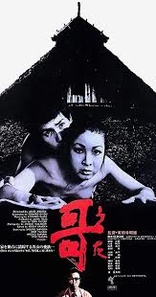
Price
Movie rating
6.7 | / 10 |
Blu-ray rating
| Users | 0.0 | |
| Reviewer | 4.0 | |
| Overall | 4.0 |
Overview
Poem (1972)
As a faithful young houseboy fully devotes himself to his spiritual duty, his teacher plans turning over his grandfather's mountain property to realtors for profit.
Starring: Hiroko Sakurai, Sabur˘ Shinoda, Shin Kishida, Ry˘ Tamura, Eiko YanamiDirector: Akio Jiss˘ji
| Foreign | Uncertain |
| Drama | Uncertain |
Specifications
Video
Video codec: MPEG-4 AVC
Video resolution: 1080p
Aspect ratio: 2.35:1
Original aspect ratio: 1.85:1
Audio
Japanese: LPCM Mono
Subtitles
English
Discs
Blu-ray Disc
Single disc (1 BD)
Playback
Region A (B, C untested)
Review
Rating summary
| Movie | 4.0 | |
| Video | 4.0 | |
| Audio | 4.0 | |
| Extras | 3.0 | |
| Overall | 4.0 |
Poem Blu-ray Movie Review
Reviewed by Jeffrey Kauffman August 18, 2019 Note: This film is available as part of
Akio Jissoji: The Buddhist Trilogy.
This provocative triptych by Akio Jiss˘ji may have attained the sobriquet The Buddhist Trilogy, but that may in turn beg the question of
whether Jiss˘ji might be subliminally proferring Heraclitus and/or the Marquis de Sade as proponents of the religion. Hercalitus famously
(supposedly) proclaimed that
itĺs impossible to step in the same river twice, giving philosophers a nice visual trope for the evanescence of life, something Japanese New Wave
expert David Desser, who is on hand here as a commentator, mentions is a key element of Jiss˘jiĺs work. But as Desser also gets into in one of his
introductions to the films which are
included as bonus features, thereĺs also a fairly kinky sex aspect to these films that some may feel arguably places them pretty squarely in what
Desser refers to
as the ôRoman pornoö genre. That may not mesh especially well with the vaunted Buddhist concept of non-attachment, since several
pairs of
lovers in these films are very attached to each other (so to speak), in sometimes shocking ways. The Buddhist Trilogy was
released courtesy of
the Art Theater Guild, a production house noted for its contributions to the Japanese New Wave, and as Desser also gets into, some of Jiss˘ji's
stylistic flourishes at least if not always all of his content "qualify" him for membership in that movement. One of the kind of funny things about
Jiss˘ji, though, is that for many
Western fans, and for fans of another kind of Japanese entertainment, he'll be forever celebrated as the creator of Ultraman, which in and of itself probably
speaks as well as anything to Jiss˘ji's versatility.
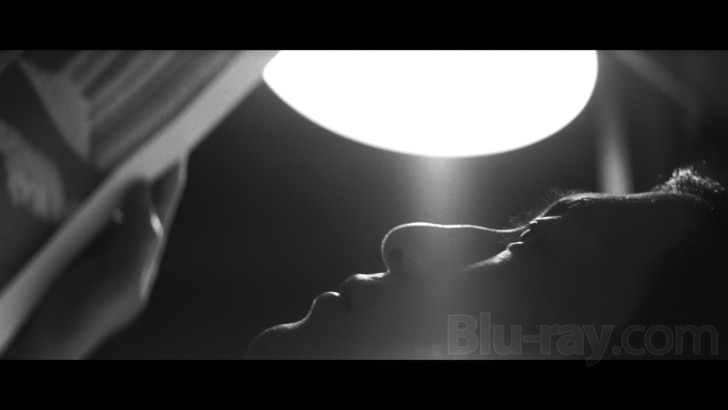
In some ways, Poem is perhaps the outlier in this set of three films, if only because it attempts to deal with what might be termed class struggles in an almost Marxist formulation. That socioeconomic underpinning gives this outing a rather distinctive air, even if some of the other elements of Jiss˘ji's other Buddhist infused films make their way into the plot proceedings. There's perhaps an unintended Biblical aspect to parts of this story, with a hapless houseboy getting caught up in schemes of his brothers, which may bring to mind one Joseph and a many colored coat. Once again Jiss˘ji's stylistic flourishes are fully on display, with odd, sudden quick tracking shots into stationary people and extreme close-ups of several characters.
Poem Blu-ray Movie, Video Quality 
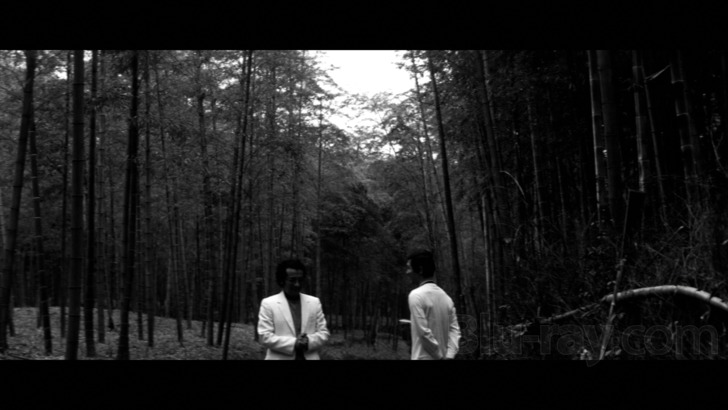
Poem is presented on Blu-ray courtesy of Arrow Academy with an AVC encoded 1080p transfer in 2.35:1. Arrow really hasn't provided my technical information on the transfer, other than some generic verbiage that masters were provided by Toho and that addtional grading work was done by R3Store. Like its black and white counterpart This Transient Life in this set, Poem looked slightly dark to me at times, though the grain field doesn't really have the gritty look it does with regard to the other film. The overall dark look of the film tends to result in some significant crush in many dimly lit scenes, and there's one sequence that is set almost entirely in the dark where very little can be made out within the frame. When close-ups are employed, which they are with great regularity, detail levels are often very impressive. As with the other offerings in this set, there is some minor damage in the form of nicks and white specks, the latter of which are probably more noticeable because so much of the film is so dark.
Poem Blu-ray Movie, Audio Quality 
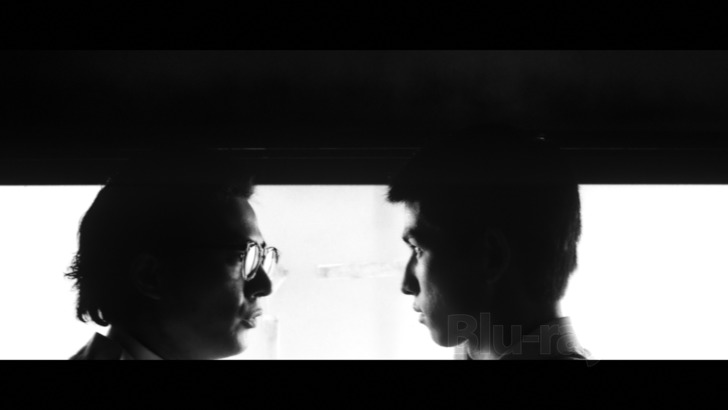
Poem features an LPCM Mono track in the original Japanese, and was to my ears the strongest overall audio presentation in The Buddhist Trilogy set. The film makes copious if unexpected use of Vivaldi's Four Seasons , and the cues sound full bodied, without some of the brashness in the upper registers that can be heard in This Transient Life in particular. Dialogue is rendered cleanly and clearly throughout the presentation.
Poem Blu-ray Movie, Special Features and Extras 
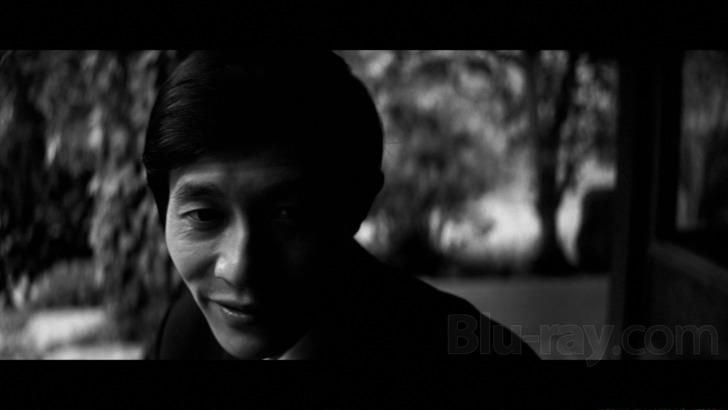
All three of the films in this set feature audio introductions (that play like commentaries to scenes from the film) and selected scene commentaries by David Desser. Kind of oddly, the selected scene commentaries have all been authored separately and there's no Play All option.
- Introduction by David Desser (1080p; 9:50)
- Selected Scene Commentaries feature 11 scenes.
- Theatrical Cut (1080p; 1:59:18) and Extended Cut (1080p; 2:16:34) versions are offered. The Extended Cut has noticeably more damage, even in some of the shared scenes.
- Theatrical Trailer (1080p; 4:38)
- It Was a Faint Dream (1080p; 1:59:16) is a 1974 film from Jiss˘ji, which explores some of the same themes of The Buddhist Trilogy, notably including non-attachment. This is offered on its own disc included in the Poem keepcase.
- It Was a Faint Dream Theatrical Trailer (1080p; 1:04) is included as a supplement on the disc containing that feature.
Poem Blu-ray Movie, Overall Score and Recommendation 
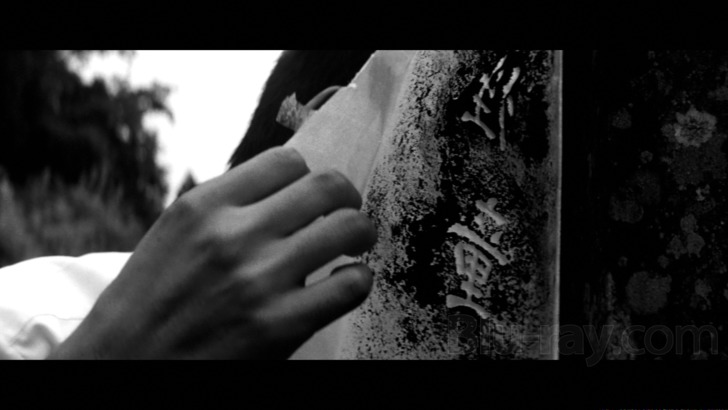
This is another really fascinating film where the presentational aspects may distract from some rather provocative content. Perhaps less immediately "objectionable" in some ways than Mandala in particular, this is still a compelling and even at times disturbing film. Technical merits are generally solid, and the added attraction of a fourth feature is appreciated. Recommended.
Similar titles
Similar titles you might also like
(Still not reliable for this title)

Mandala
Mandara / 曼陀羅
1971

This Transient Life
無常 / Mujō
1970

Heroic Purgatory
煉獄エロイカ
1970

Eros + Massacre
エロス+虐殺
1969

Coup dĺÚtat
戒厳令
1973

The Ballad of Narayama
Narayama bushik˘
1983

Maborosi
幻の光 / Maboroshi no hikari
1995

Yumeji
1991

Killing
2018

After the Storm
海よりもまだ深く / Umi yori mo mada fukaku
2016

I Wish
Miracle / 奇跡 | Kiseki
2011

Like Father, Like Son
2013

Spacked Out
Mo yan ka sai / Wu ren jia shi / 無人駕駛 / Slipcover in Original Pressing
2000

Boat People
投奔怒海 / Tau ban no hoi
1982

The Disenchanted
La dÚsenchantÚe
1990

I Live in Fear
Ikimono no kiroku
1955

The Third Lover
L'oeil du malin
1962

Gushing Prayer
Funshutsu kigan - 15-sai no baishunfu
1971

On the Beach at Night Alone
밤의 해변에서 혼자 / Bamui haebyeoneseo honja
2017

The Love of a Woman
L'amour d'une femme
1953